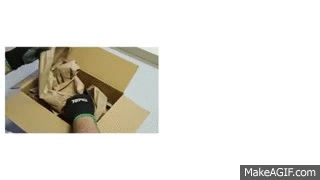Paper Cushion vs Air Cushion Packing Material
Evaluating packaging material? Here is a look at the evolution of protective packaging methods of paper packaging to air cushion packaging from FP International.
Last updated on
Last updated on
FP International talks about paper and air cushions. Showing you the differences and why air cushions might be a better fit for your needs.
Video Transcript
For centuries people have had the need to pack and protect goods. In the early days tree leaves and cloth were used for protection. Later paper was introduced to protect goods during storage and transportation. For a long time paper has served well as protective packaging material. By the end of the 20th century, air cushions were intended to protect goods during transport. Air cushions have a number of advantages compared to paper. First paper could be abrasive and can slightly scratch the goods it should protect as air cushions have a smooth and soft surface they will not damage the package goods. second crumpled paper usually leaves some dust on the package goods. this does not contribute to the image of received parcels. as it cushions are cleaned the goods will remain dust free. The package will arrive neat and clean at the customer. Then paper can dehydrate and scratch or cut the packers hands. As air cushions don’t have sharp edges they’re not abrasive to the packers hands. Finally parcels are not always handled with care, and may endure heavy stress during transport. After having absorbed shocks and vibrations for sometime paper will settle down and will no longer provide proper protection to the product. Air cushions keep their volume and will continue to protect the cargo even after time goes by. When dropped from the same height of vase wrapped in paper breaks while the same vase wrapped in air cushions remains intact. Even when dropped from increased height air cushions are still able to absorbe shocks and to protect the contents. Because today’s number one request in packaging is quality, air cushions can offer the best packaging alternative for your products, your people ,and your customers. FP international inventing the future.
and clean at the customer. Then paper can dehydrate and scratch or cut the packers hands. As air cushions don’t have sharp edges they’re not abrasive to the packers hands. Finally parcels are not always handled with care, and may endure heavy stress during transport. After having absorbed shocks and vibrations for sometime paper will settle down and will no longer provide proper protection to the product. Air cushions keep their volume and will continue to protect the cargo even after time goes by. When dropped from the same height of vase wrapped in paper breaks while the same vase wrapped in air cushions remains intact. Even when dropped from increased height air cushions are still able to absorbe shocks and to protect the contents. Because today’s number one request in packaging is quality, air cushions can offer the best packaging alternative for your products, your people ,and your customers. FP international inventing the future.
Copyright © 2011- 2016 Void Fill Packaging

The pulse of the packaging community